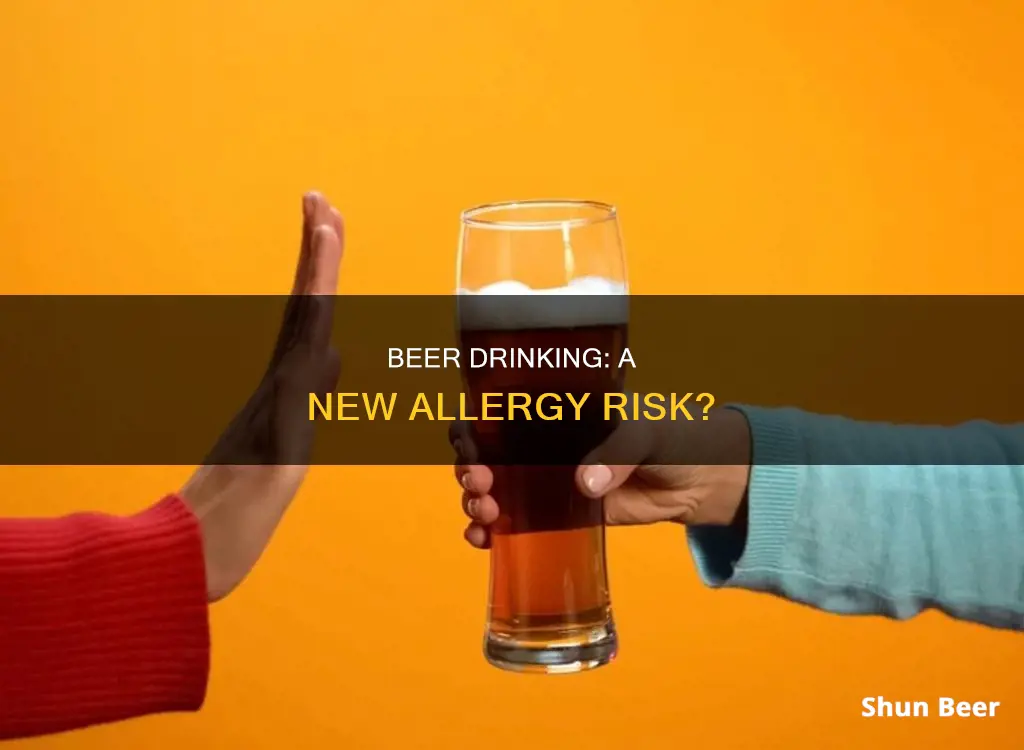
Beer is one of the world's most popular alcoholic drinks, but some people can experience adverse symptoms after drinking it. While true beer allergies are rare, many people are intolerant or sensitive to one or more of its ingredients, which can lead to reactions ranging from mild discomfort to life-threatening emergencies. It is important to understand the distinction between a beer allergy and a beer intolerance, as well as their symptoms, causes, diagnosis, and management. So, can you become allergic to drinking beer?
| Characteristics | Values |
|---|---|
| Beer allergies rare? | Yes |
| Beer intolerance rare? | No |
| Beer intolerance same as alcohol intolerance? | No |
| Beer allergy symptoms | Anaphylaxis, rapid/weak pulse, nausea, vomiting, shortness of breath, swelling, trouble breathing, abdominal pain, dizziness, lightheadedness, rapid/irregular heartbeat |
| Beer intolerance symptoms | Bloating, gas, diarrhoea, nausea, rash, hives, eczema, congestion, wheezing, difficulty breathing, abdominal pain |
| Beer allergy diagnosis | Skin prick test, blood test, elimination diet |
| Beer intolerance diagnosis | Elimination diet |
| Beer allergy treatment | Avoid beer, carry epinephrine shots, wear medical ID bracelet |
| Beer intolerance treatment | Avoid beer, read labels, opt for alternative grains, be cautious of craft beers, avoid cross-contamination |
What You'll Learn

Beer allergy vs intolerance
True beer allergies are rare, but they do exist. Beer contains many ingredients other than water, such as malt barley, brewer's yeast, hops, and assorted flavorings. It's likely that an allergy to beer is an allergy to one of these specific ingredients.
A beer intolerance is different from a beer allergy. An intolerance is a digestive response, whereas an allergy is an immune response. With an intolerance, your digestive system has trouble with a particular food or drink. Beer intolerance could be caused by an intolerance to alcohol, or to another ingredient in beer.
Symptoms of Beer Allergy
If you have a beer allergy, you will probably experience common food allergy symptoms, such as:
- Abdominal pain and bloating
- Tightness of the chest
- Hives
- Wheezing
- Chest pain
- Diarrhea
- Heartburn
- Shortness of breath
- Swelling of the throat or tongue
- Loss of consciousness
Symptoms of Beer Intolerance
The most common signs and symptoms of beer intolerance are:
- Stuffy nose
- Skin flushing
- Facial redness
- Red, itchy skin bumps (hives)
- Worsening of pre-existing asthma
- Runny nose
Diagnosis
If you are experiencing symptoms after drinking beer, you should see your doctor. They can help determine if you are allergic to a specific ingredient in the beer, or if you have an intolerance. Allergy testing of the skin and blood should be able to determine your allergies, or at least rule some out.
Walking and Drinking Beer Legally in Venice
You may want to see also

Common allergens in beer
Beer allergies are rare, but they can be caused by an allergy to one of the many ingredients in beer. Beer is typically made from water, malt barley, brewer's yeast, hops, and assorted flavorings. The most common allergens in beer are gluten, histamine, sulfites, and yeast.
Gluten
Gluten is a protein found in wheat, rye, and barley. People with a gluten allergy, sensitivity, or celiac disease must follow a gluten-free diet. Since barley is the main ingredient in beer, those with a gluten allergy must avoid beer or stick to gluten-free options.
Histamine
Histamine is produced during the fermentation process, as yeast converts sugars to alcohol. People with histamine intolerance have decreased or inhibited enzymes that break down histamine from food, causing it to enter the bloodstream and trigger symptoms such as rashes and itching.
Sulfites
Sulfites are added to beer after fermentation and can cause allergic reactions such as asthma symptoms, allergic rhinitis, and, in rare cases, anaphylaxis.
Yeast
Brewer's yeast is made from a fungus and is present in all fermented alcohol, including beer. While rare, yeast allergies can cause allergic reactions such as hives and digestive symptoms and, in some cases, serious allergic reactions.
Other common allergens found in beer include wheat, sorghum or sorghum malt, and eggs (usually in wine).
Drinking Beer at the Airport: Lobby Laws and Limits
You may want to see also

Beer allergy symptoms
Beer allergies are rare, and you may actually have an intolerance to beer or an allergy to a specific ingredient in beer. However, it’s important to seek a proper diagnosis to determine if you do have a true beer allergy.
If you are allergic to beer, you’ll probably have symptoms much like those of other allergic reactions. This includes:
- Abdominal pain and bloating
- Tightness of the chest
- Hives
- Wheezing
- Chest pain
Allergic reactions that involve hives, wheezing, and chest pain can occur almost immediately and should be considered severe and potentially life-threatening. If you experience these symptoms, you should seek immediate medical attention.
If your symptoms are very mild, you may have a food sensitivity or intolerance rather than a true allergy. This can be uncomfortable, but it’s not an immune system response and isn’t as serious.
If you have a beer allergy, you may be allergic to one of the ingredients in beer, such as:
- Malted barley or other grains, such as wheat and sorghum
- Coloring, flavoring, and preservatives
- Histamine, a byproduct of fermentation or brewing
- Sulfites
- Brewer’s yeast
If you experience uncomfortable symptoms after drinking beer, there are a few things you can do:
- If your symptoms are mild, try switching to another brand to see if you can drink it without any issues.
- An over-the-counter antihistamine may also help with mild symptoms. Your doctor can prescribe a more powerful antihistamine if your symptoms are severe.
- Get tested for allergies. You can start the process with your family doctor or see an allergist. Ask to be tested for ingredients commonly found in beer, such as wheat, barley, and sorghum. Be sure to note whether you have the same symptoms after eating or drinking other food products.
Does Helium-Infused Beer Really Work?
You may want to see also

Diagnosing a beer allergy
Beer allergies are rare, and you may actually have an intolerance to beer. However, it’s important to seek a proper diagnosis to determine if you do have a true beer allergy.
Visiting a Doctor
If you have symptoms of an allergy after drinking beer, you should see your doctor. They can help determine if you’re allergic to a specific ingredient in the beer. This will help you avoid that ingredient in other products.
Allergy Testing
Allergy testing of the skin and blood should be able to determine your allergies, or at least rule some out. Skin tests are the standard diagnostic tool for finding out if someone has allergies. A provider puts tiny amounts of potential allergens on your skin during a skin test. If you are allergic, you’ll get a rash or itchiness during the test.
Blood tests can also be used for allergy testing. Blood tests look for antibodies to specific allergens in your blood. A large number of antibodies may signal that you have an allergy.
Food and Symptom Diary
Your doctor may ask you to keep a food and symptom diary. This can help you keep track of when your symptoms appear and whether they line up with certain things—such as alcohol.
Elimination Diet
Once you notice patterns, your doctor may recommend an elimination diet. This involves cutting a specific food out of your diet to see if your symptoms get better, and then reintroducing it to see if they come back.
Provocation Test
A provocation test involves consuming a small amount of beer to see if it evokes a reaction. You should never attempt a provocation test on your own. These challenges should be done in a clinical setting.
Beer and Fitness: Can You Have Both?
You may want to see also

Managing a beer allergy
If you have a beer allergy, the best way to manage it is to avoid drinking beer. However, if you don't know the ingredient in beer that triggers your symptoms, you might be able to drink beers that don't contain that ingredient. Here are some tips to help you avoid potential triggers:
- Read labels carefully: Always check the ingredient lists on beer labels and watch out for potential allergens or triggers, such as barley, wheat, or yeast.
- Opt for alternative grains: If you're sensitive to gluten or certain grains used in traditional beer brewing, try beers made from alternative grains like rice, sorghum, or millet.
- Be cautious of craft beers: Craft beers can contain unconventional ingredients that may trigger reactions, so research the ingredients before consuming them.
- Avoid cross-contamination: If you have a severe beer allergy, be mindful of potential cross-contamination risks, such as shared glassware or preparation surfaces.
If you'd rather avoid beer altogether, there are plenty of other options, both alcoholic and non-alcoholic. Here are some alternatives:
- Hard ciders and wines: These may be suitable alternatives for some individuals with beer intolerances or allergies, depending on their specific triggers.
- Non-alcoholic beers: While these can still contain traces of allergens, they are a much safer option for those with mild beer intolerances or sensitivities.
- Cocktails and mixed drinks: Spirits like vodka, gin, or tequila can be great alternatives, as long as you avoid any beer-based mixers.
- Mocktails and non-alcoholic drinks: There are plenty of creative mocktails and non-alcoholic beverages available for those who prefer these options.
If you find yourself feeling uncomfortable in social situations where people around you are drinking beer, don't hesitate to be upfront and honest with your peers or friends about your dietary restrictions. Allergies are common, so most people will be understanding. You could also consider bringing your own alternative drinks to social gatherings.
Beer and Zyrtec: Is It Safe to Mix?
You may want to see also
Frequently asked questions
The symptoms of a beer allergy are similar to those of other allergic reactions. They include abdominal pain and bloating, tightness of the chest, hives, wheezing, and chest pain. An allergic reaction to beer usually happens within a couple of hours, but some reactions can occur almost immediately and should be treated as severe and potentially life-threatening.
Beer allergies are caused by an immune system response to a specific ingredient in beer. While beer is mostly made up of water, it contains many other ingredients, including malt barley, brewer's yeast, hops, and assorted flavourings. It's likely that you're allergic to one of these ingredients.
A beer allergy is a response from the immune system, whereas a beer intolerance is a digestive response. If you have a beer intolerance, your body may lack the specific enzymes needed to break down certain compounds within the beer.
If you think you have a beer allergy, it's important to consult a medical professional, such as your GP or an allergist. They will be able to recommend further testing, such as a skin prick test or a blood test, to determine whether you have an allergy or intolerance, and to identify the specific triggers.







